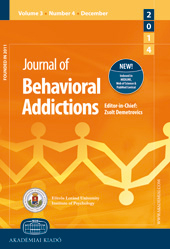Ten myths about work addiction
Ten myths about work addiction
Author(s): Mark D. Griffiths, Zsolt Demetrovics, Paweł AtroszkoSubject(s): Behaviorism
Published by: Akadémiai Kiadó
Keywords: behavioral addiction; study addiction; work addiction; workaholism; work engagement
Summary/Abstract: Research into work addiction has steadily grown over the past decade. However, the literature is far from unified and there has been much debate on many different issues. Aim and methods. This paper comprises a narrative review and focuses on 10 myths about work addiction that have permeated the psychological literature and beyond. The 10 myths examined are (a) work addiction is a new behavioral addiction, (b) work addiction is similar to other behavioral addictions, (c) there are only psychosocial consequences of work addiction, (d) work addiction and workaholism are the same thing, (e) work addiction exclusively occurs as a consequence of individual personality factors, (f) work addiction only occurs in adulthood, (g) some types of work addiction are positive, (h) work addiction is a transient behavioral pattern related to situational factors, (i) work addiction is a function of the time spent engaging in work, and (j) work addiction is an example of overpathogizing everyday behavior and it will never be classed as a mental disorder in the DSM. Results. Using the empirical literature to date, it is demonstrated that there is evidence to counter each of the 10 myths. Conclusion. It appears that the field is far from unified and that there are different theoretical constructs underpinning different strands of research.
Journal: Journal of Behavioral Addictions
- Issue Year: 7/2018
- Issue No: 4
- Page Range: 845-857
- Page Count: 13
- Language: English

